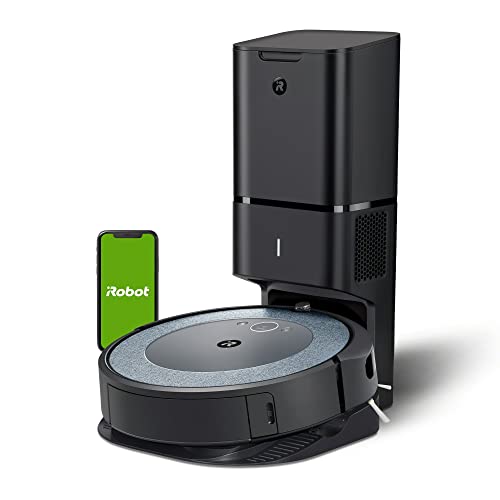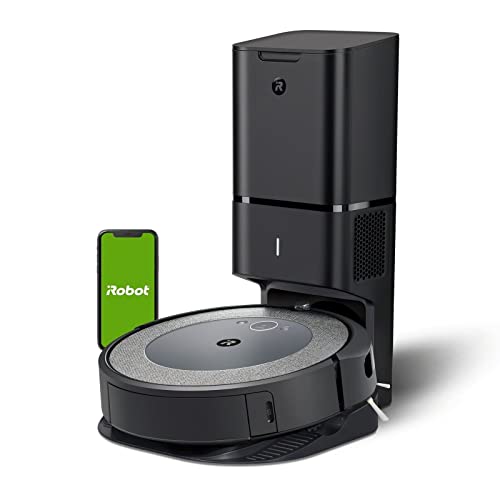The 10 Most Scariest Things About Robot Vacuum With Self Emptying
Cory
0
19
09.06 00:53
 Maximizing Convenience With a Robot Vacuum With Self Emptying
Maximizing Convenience With a Robot Vacuum With Self Emptying A robot vacuum with self emptying adds a significant amount of value and comfort to any device compatible. It prevents the reintroduction of debris into the house and also reduces allergens.
A robot vacuum with self emptying adds a significant amount of value and comfort to any device compatible. It prevents the reintroduction of debris into the house and also reduces allergens.It also creates a interactive map of the house and allows users to block certain areas. It also eliminates obstacles that could cause a trip for other robotic vacuums.
Cost
A robot vacuum is an expensive investment. The cost of a vacuum that can self-empty can be up to $1000. If you want to get the most convenience and ease of use, the robot vacuum is a worthy investment. It's a time saver to be able to eliminate manual emptying, especially if you live in an apartment or have a large home. It will save you a lot more headaches and let you use the robot vacuum cleaner more often.
Be aware of the battery's lifespan and the size of the dustbin before buying a robot vacuum that self-empties. A robot vacuum that has an extra large dust bin will be able to contain more debris, which will reduce the necessity to empty it manually. A longer battery life gives you more freedom to schedule cleanings when you're away from home.
Most self-emptying robot vacuum with self empty (visit my web site) vacuums offer some form of noise control that is beneficial for those who live with people who are sensitive to noise. The majority of robot vacuums are quieter than lawnmower or garbage disposal. There are however models that are quieter than other models. Online reviews and comparisons can help you determine the best self cleaning mopping robot model for your home.
The top robot vacuums come with many features, including mapping and scheduling, mop/vacuum switch options, and a long battery life. They also have obstacle avoidance, meaning that they can navigate around obstacles like cords that are tangled and pet toys without getting flustered. Some are compatible with wooden floors.
A quality robot vacuum cleaner should have a dustbin that can hold at least two cups. This is important because it will determine how many times you have to empty the robot vac's base. If you have pets or children who tend to make mess, it is recommended to pick a model with an ample capacity.
A robot that has smart-home connectivity is also a great idea. This feature lets you to control the robot's vacuum remotely via your smartphone or smart speaker which can save you lots of time and energy. Some of the most advanced robots can even detect a spill and instantly begin to mop the floor.
Convenience
A self-emptying robot vacuum is a great purchase when you're a busy person who must do more in less time. This feature makes the cleaner more reliable and efficient, so you can make use of it more often. It is also a good option for families with children or pets, as it can manage the mess.
The self-emptying system removes the debris from the dust bin of the robot and puts it in larger bins at the base station. The bin is usually bagged, so you won't have to contend with dust lumps sticking to your hands when emptying it. The bag also stops allergens from escaping into the air, which is especially useful when you suffer from allergies. You can even get an alert on the app when the bin is full, which eliminates the effort of emptying it every three or two cleaning cycles.
Certain robots are designed to clean your home while you are away. This is an excellent feature for those who need to work late or people who frequently travel. This will free your time for other important tasks.
A self-emptying robotic vacuum can be programmed to start cleaning even when you're not at home with the help of its connected app. You can create a schedule for your robot to follow and you can also program it to alter its suction power settings to different types of flooring. It can also recognize boundaries, such as walls or stairs and maneuver itself around them.
One of the most beneficial characteristics of a robotic vacuum that self-empties is its abilities to recognize objects. These make it able to detect any changes in the floor surface and adjust to accommodate them. It also can detect obstacles and barriers, such as furniture, to avoid causing damage. It can also sense the difference between carpet and wood floors, allowing it to automatically adjust its settings. It can also steer clear from stairs and recognize them, thereby preventing the machine from falling.
A robot vacuum equipped with self-emptying features can be programmed to turn off automatically when it reaches certain areas. This is great for avoiding accidents when you're away from home, and it can be particularly beneficial in tight spaces.
Battery life
Robots have a limited battery life, so they require frequent recharge. The top models can last longer on a single battery charge. The battery's life is also affected by the cleaning mode, power mode, and kind of floor surface. Consider buying a spare for your robot if you use it frequently.
One of the best deal on self emptying robot vacuum things about a self-emptying robotic vacuum is that it doesn't need to empty its dust bin after every cleaning session. Instead, the robotic cleaner automatically transfers debris to the base of its charging dock. This decreases the frequency at which you must empty your home and prevents debris from being introduced back into the home. The transfer of debris is noisy.
Most robot vacuums come with some kind of navigation system that lets them move around the house without bumping into obstacles or getting stuck. Certain models are difficult to navigate the clutter of furniture or rooms. The Shark IQ Robot, for instance, is a model that has a pleasant ability to maneuver, but it can be snagged under sofas or hit cords or rug tassels.
Some robots can create maps of your house and can recognize obstacles like stairs. Others can even detect when they are near the pet and switch to "spot" cleaning mode. They can also be programmed to return to the charger after a certain amount of time. This is a great feature for families with pets and children.
The app of the robot allows you to define "no-go zones" for instance, a certain room, office or other area. Older models require you to put boundary lines around the areas that you don't wish your robot vacuum to enter. Newer models, however, usually remember these boundaries and respect them automatically.
Robots with a self-emptying robot vacuum for pets charging station are ideal for large homes that are prone to frequent small messes, but can't afford to run their regular vacuum cleaner daily. They can keep your home clean on a regular schedule and keep dust and allergens from accumulating. It is important to remember that leaving a robot vacuum on for a long period of time will deplete its battery. However, there are easy tips and tricks that can prolong the lifespan of your robot's battery.
Object Recognition
Object recognition is a feature of AI that allows your robot to know exactly what it is cleaning. For example it can recognize cords, socks, toys, etc. It scans the surroundings for objects and records them in its database. This will help your robot avoid slipping on them while it cleans. This feature is great for people who have pets or children who may accidentally leave things lying around.
This model is able to avoid certain areas using lidar and digital keep-out zone mapping, unlike many other robovacs that use cameras. It is equipped with strong edge cleaning capabilities which makes it a good choice for homes with carpets. The app is simple to use and lets you schedule cleaning sessions and block off certain rooms. It's not as sophisticated as other models in this category, but it is still an excellent choice for homes with small spaces.
The iRobot X2 is a self-emptying robot with an innovative design that lets you empty the garbage bin without touching it. This technology allows your robot to help clean your home more often and maintain it in a cleaner condition for longer. The X2 is designed so that the dust bin onboard does not overflow and returns automatically to its docking station after it is full.
Some of the top robot vacuums that have self-emptying capabilities come with a docking station. It connects to the set of vacuums that take debris from the dust bin of the robot into a larger storage container. It is simple to change the bin, but emptying it manually can be a hassle. Certain models let you set a timer for cleaning so that you can leave the bin for weeks.
To test the capabilities of robots to self-empty, we added a weighed quantity of sand to the dust bins on each. To determine how well each robot worked, we compared the amount dry debris it transferred to its charging station. The models that transferred more dry debris to the charging bases received higher scores.